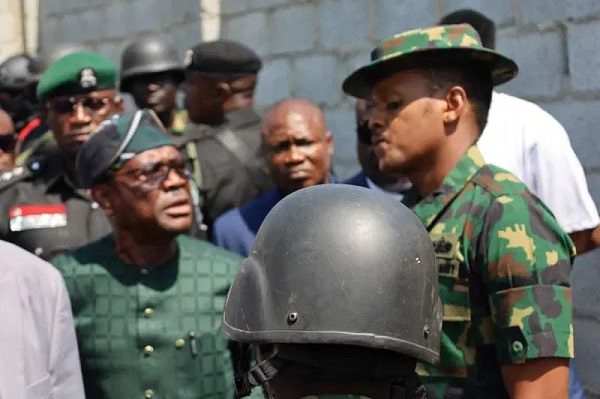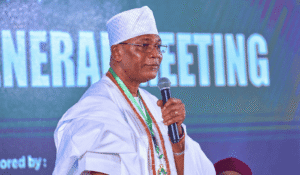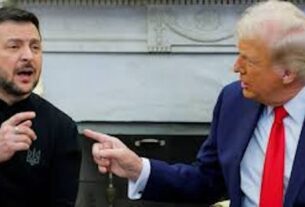…says his action offence against the state
The Minister of Federal Capital Territory, Nyesom Wike’s face-off with the young naval officer, Lieutenant Ahmed Yerima, has continued to generate different opinions.
A former Chief of Defence Staff, General Lucky Irabor, on Thursday, faulted Wike over his verbal exchange with the Naval Officer.
Irabor spoke at the 21st All Nigeria Editors Conference (ANEC) in Abuja.
He said the minister committed an offence against the state, adding that he had no right to make such remarks.
He said, “Just a few days ago, we saw an incident between the Honourable Minister of the FCT and a military officer. And there have been a number of representations that I have read in the media, which I thought some of us got right, and others did not.
“They missed the point. And I am including the representation of a SAN, which I think missed the point. Now, what is it? The uniform is not about who is wearing it.
“The uniform represents the authority of the states. Whether it is a small boy or not, it is the authority of the states. It is even worse when it is a commissioned officer who has a presidential commission.
“And so, when you make such disparaging comments, you have desecrated the oath. What you have told the Commander-in-Chief and the authority that invested that position in him is that they are fools.
“So, it is wrong. And I think that for the media… In any case, the law has two ends. For those, we also studied law, hands on their head.
“But again, in military law, we also taught that for you to be able to establish a crime, there are two elements. Actus reus and mens rea. Actus reus, meaning was this thing done?
“Is there something that was done? What is the intention behind it? So, when a SAN says that the minister has authority over land and it is not the duty of the soldier, that is not the issue.
“Now, if you have any reason to believe that what the young man is doing is a channel, that is the law. So, you are desecrating the oath; it has not left the realm of what the officer was doing. It is an offense against the state.”
He argued that citizens have lost the educational traction to know how to treat military officers in uniform. He tasked the media to highlight the values of good citizenship and patriotism.
“So, this is what you, the media, must try to highlight. I know that over the years, we have lost our educational traction. See, these are things that primary school pupils, secondary school pupils ought to know.
“That people like us don’t do anymore. The whole essence of contracts, alright? The contracts that you have with the states. That every individual has ceded his rights to the states because of things like this.
“So that we will not, at every front line, take the law into our hands. It is not a jumble. So, if the state has designated certain establishments and they get them in uniform, only to be able to easily recognize them,” he said.
He pointed out that even he, as a military officer, lacked the power to lay his hands on any officer because it is against the law.
“But assuming I was wearing a uniform today, it’s a different matter entirely. The officer asks a question. If you see him tomorrow wearing a uniform, you will not see him.
“So, what distinguishes the police, the military, and other agencies is the uniform. And so, respect and honour the uniform. And that’s what we should tell our children.
“That every Nigerian, when you see them, are they doing what is right? They may not be doing what is right. But then, it is not your duty to not lay your hands on them. Otherwise, we will be in a jumble.
“That’s exactly what’s happening. That counter-terrorism has become a ding-dong thing. If you go to a studio meeting, nobody knows what is right and what is wrong.
“What was done with good intention is misinterpreted. Because of things like that. And that is why I thought that since we are talking about media, terrorism, and national security, addressing the complexities.
“This is a part of the complexities. That would give a wrong impression to those. Tomorrow, people will now think that when you see a military man, you slap him.
“It is a jumble. Why would you do that to a policeman? Me, as a general, I can’t slap my soldier. I can’t touch him.
“I can’t use my hand on him. If I do that, either I apologize to him, or I will be disciplined. The same thing across the world,” he added.
He argued that even in the United States, citizens do not go around fighting officers because they know the implications.
“When police brutalize a citizen in the U.S., do you see people go around trying to fight them?.
“Because they respect the uniform. But is he misusing the uniform? Yes. Will he be dealt with? Yes
“So let us get a distinction. I thought it would be a good opportunity to do so. As I conclude, what I need us to take away is that we were reminded yesterday that as editors of the media organizations, because we are dealing with national security issues, you are the last man standing.”
Wike had accused a former Chief of Naval Staff, Vice Admiral Zubairu Gambo (rtd.), of land grabbing and had directed the Department of Development Control to demolish the property, but they were prevented by armed military officers, led by Yerima.














